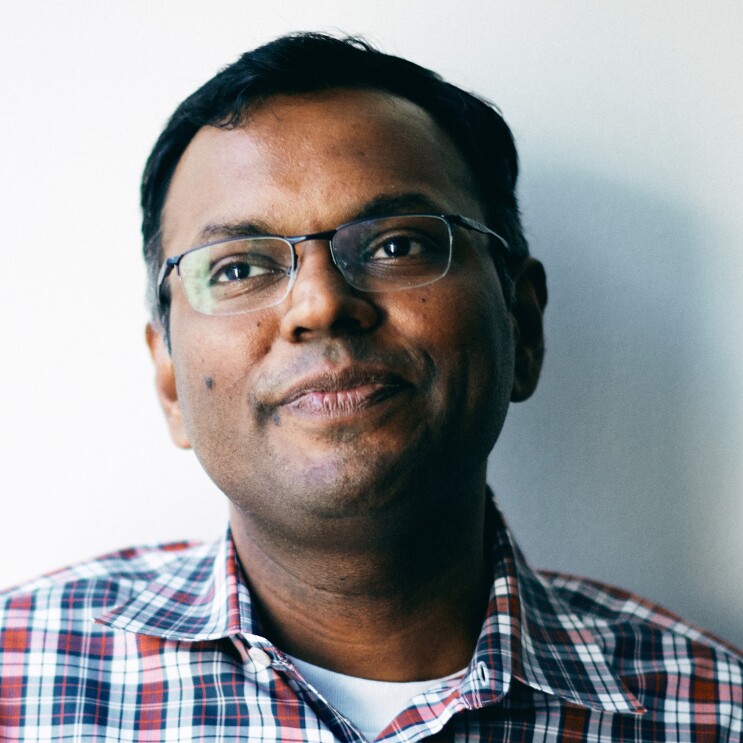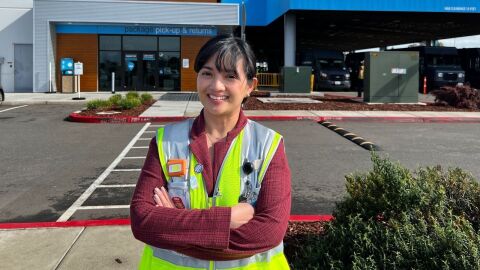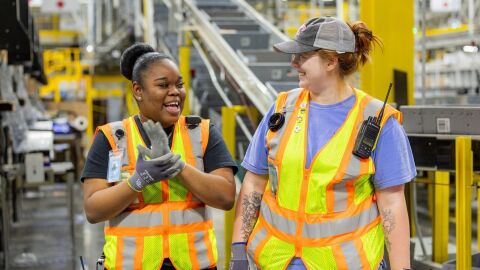Swami Sivasubramanian is vice president of machine learning at Amazon, joining Amazon as an intern in 2005. In the course of his career at Amazon, Swami has played a leadership role in the development of some of the IT industry's most significant innovations including Dynamo — the technology that reimagined databases, and today powers massive workloads at Amazon and many of AWS's customers.
Which living person do you most admire?
President Obama. He drove such a positive change in society with a positive message of empowerment.
What is your greatest fear?
I grew up in rural India, and our family had its fair share of cobras in the backyard. So I’m going to go with snakes. However, I must mention that my wife loves snakes, and would be totally okay with us having a snake as a pet.
What is your current state of mind?
I’m an eternal optimist. You will always find me smiling. If you talk to my team, they will say that this is sometimes spooky, because they don’t know if I’m happy or sad. But to be honest, I’m truly blessed to be able to do what I’m doing, which is to help build technologies that are changing the IT industry. I have nothing to complain about, personally or professionally.
What is your first memory of a computer?
I didn’t come from an affluent family, so we didn’t have a computer at home when I grew up. My first memory of a computer is from my high school. We had one computer for the entire school. Each student got to use the computer for ten minutes a day. Since we had to share one computer, we were automatically incentivized to make sure that our code ran smoothly. With the limited time, we had to be human compilers to detect syntax errors ahead of time. It was a great life lesson to make sure you dot your Is and cross your Ts.
Who or what is the greatest love of your life?
My wife, who has been a great partner through thick and thin.
What is one thing you do every week to stay focused on customer needs?
The single most important reason Amazon has been successful is how we always stay focused on delivering on the leadership principle of Customer Obsession. I value staying close to customer needs and hearing feedback first hand. With machine learning being top of mind for most CIOs and CTOs, I meet with customers at least two to three times in a typical week. In addition to these face-to-face meetings, I also spend time studying metrics related to customer feedback in our weekly business reviews.
What publications do you read to stay current with external trends?
I love reading academic literature. So I end up reading publications from conferences like SOSP, VLDB or OSDI. I make it a habit to read at least one academic publication every week. I also enjoy reading tech magazines like TechCrunch and Geekwire to stay on top of everything that's going on in the tech world.
Which words or phrases do you most overuse?
My team tells me that I say "to be clear" a lot, as well as "Dive Deep."
When and where were you happiest?
I'm generally a happy person. I'm always the happiest when I am at home with my wife and our daughter. The feeling of going back home every evening, and seeing my three-year-old daughter running towards me is inevitably the highlight of my day.

What was the last time you were wrong about something?
I'm not right all of the time. At least for me, part of the trick to being right a lot is to listen intently to early signals, pay attention to customer feedback and act on your team's intuition. There are many decisions as recent as in Amazon SageMaker where the prioritization of features was not what I would have done, but I was happy to listen to the team and we have seen great results. Amazon SageMaker is off to a great start, and is one of the fastest growing AWS services in terms of the number of developers. I guess you could say that in this case I was happy to be wrong.
Which talent would you most like to have?
I wish I'd learned how to play a musical instrument. My favorite musician is A.R. Rahman, and I would love to be able to play the piano even one percent as good as him.
If you could change one thing about yourself, what would it be?
I would love to find more time to read more.
What do you consider your greatest professional achievement?
I would actually pick two achievements.
The first has to be bootstrapping the NoSQL database ecosystem at Amazon. I was fortunate to be part of the initial team that built the original Dynamo. And when I moved to AWS, I found that our top customers were asking us to offer “Dynamo as a cloud service” to address some of their scalability and availability challenges. That's when AWS gave me the responsibility of building a cloud version of Dynamo.
I am also proud of bootstrapping the machine learning business at Amazon. The idea for the business came about fortuitously. My daughter turned one and we took her back to India to meet her grandparents. I was jetlagged for a few weeks and I took the opportunity of the “awake time” to teach myself different facets of deep learning. I found the potential of AI technologies for our customers incredibly exciting. While I am by no means an expert in ML, it was clear to me that ML has broad applicability and we need to build new set of capabilities to help our customers leverage ML. So, when I returned, I wrote a narrative summarizing what are the kind of services/capabilities we need to build to support ML workloads. I presented the document to AWS leadership. After reviewing that narrative, they asked me to lead the ML business for our customers.
I'm not an expert in machine learning by any means. And I still feel like a novice. But I’m excited about the applications of machine learning in fields like healthcare, hospitality, retail and finance. It’s great to see that in just nine months after launch, tens of thousands of customers are leveraging our Machine Learning Services, and we are growing 250% year over year.
What superpower would you like to have?
I would come back as a person who could time travel. It would be great to go back and see historical moments in time, like when India got her Independence on August 15, 1947.
Where would you most like to live?
My wife and I love Seattle. We love the outdoors (and seasons) in Seattle, though you could argue that the winters in Hawaii are better.
What is your most treasured possession?
My dog’s collar, which I carry around all the time – our retriever Theo passed away recently.
What are some innovations from your organization that inspire the most pride within you?
It is super hard to pick your favorites among your products (which are like your children). So, I am picking a few that has had big impact on customers.
I’m proud of AWS DeepLens, the world's first fully programmable deep learning enabled video camera. We asked ourselves a fundamental question to create the product: How do you actually make machine learning accessible and put it in the hands of developers? And that's how we came up with the idea for DeepLens.
It's a simple device. Right from the time you take to unbox the device, within 10 minutes, you can build a computer vision application powered by deep learning. Two months ago, we ran a nationwide hackathon for Deep Lens. The winner had no prior knowledge of machine learning. But he used DeepLens to create an application that was able to read children's books for his kids.
I would also call out Amazon Sagemaker. It has empowered developers and data scientists with machine learning models, and enabled them to take their ideas quickly to production. To give just one example, Intuit’s team tell us that they were able to cut down their model development for applications related to fraud detection and personalization time by up to 90%.
Finally, we announced many new solutions at re:Invent 2018 that make me proud of the team and the innovations they have enabled for our customers. These include the Amazon EC2 P3dn Instance that helps customers handle the heavy compute loads required for machine learning, and other announcements such as AWS Optimized Tensor Flow, Amazon Inferentia, the enhancements to Amazon Sagemaker, Amazon Textract, Amazon Forecast, Amazon Personalize and AWS Robomaker. But I’d like to call out DeepRacer – it’s such a clever and innovative way for programmers to get started with reinforcement learning. Like AWS DeepLens, it’s another example of how we have taken away the complexity, and placed a transformational technology in the hands of our developers. Overall, I am super excited about the overall ML stack in AWS and how quickly we have grown in this space with tens of thousands of customers meaningfully using our products and solutions.
When was the last time you disagreed and committed to something?
I find Amazon’s working backwards mechanism to be a great help in either getting me to agree to a decision, or to challenge the underlying assumptions. I can't recall the last time I had to disagree, because the moment we actually write a crisp narrative, I find myself either agreeing with the logic behind the recommendation, or in a position where I can challenge the team in a positive way. Eventually, we all get to a point where all of us mutually agree and commit.
What was a moment in time that altered the direction of your career?
For me, that moment would have to be when I met Werner Vogels at a conference on distributed learning fourteen years ago. We had a chat and Werner asked me to take on an internship at Amazon. You have to remember that in 2005, Amazon was not a default choice for PhD students. But what I found out after talking to Werner was that Amazon is solving some of the hardest problems in computer science. That prospect got me genuinely excited, to not only try many see these ideas come to life in real-world production environments, but also to actually change the landscape of the IT industry.
What is an example of a great piece of advice you have received?
My current manager once told me to not worry about short term career growth. Instead you should focus on taking on the hardest challenges, and build amazing products to that delights customers. Your career will take care of itself. This piece of advice is super hard to put into action. But as it turns out, if you work on some of the hardest problems and solve them for your customers, the chances are high that you will naturally grow in your career.
What was the last thing you purchased on Amazon?
I purchased a pair of ballet shoes for my daughter on Amazon as she started ballet a week ago.












